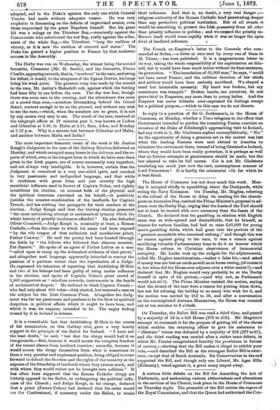The House of Commons has not done much this week.
Mon- day it occupied chiefly in squabbling about the Dockyards, while- voting the Navy Estimates. On Tuesday, Mr. Hughes, referring to the refusal of the House to delay its meeting for the church- goers on Ascension Day, resisted the Prime Minister's proposal to ad- journ over the Derby Day, urging that the feasts of the Turf should not at least be treated with more ceremony than the feasts of the Church. He declared that the gambling in relation with English races was so wide-spread and discreditable, that he himself, as. trustee for various families, had had to raise £20,000 for young men's gambling debts, which had gone into the pockets of the- " greatest scoundrels who remained unhting ;" and though this was no reason against going to the race, it was a reason against sacrificing valuable Parliamentary time to do it an honour which the House refuses to Christian observances of immemorial antiquity. Mr. Locke took up the cudgels for the adjournment, called Mr. Hughes sanctimonious,—rather a false hit,—and asked if money was not lost on cards as well as on horse-racing, (of course it is, but when did the House ever adjourn over a whist match ?)—and declared that Mr. Hughes would very probably be at the Derby himself in spite of his protest,—(and why not, as Parliament would not sit?). The Prime Minister resisted the motion, saying that the abuses of the race were a reason for putting them down, but not for refusing the holiday to so many who wish for it, and the motion was carried by 212 to 58, and after a conversation. on the contemplated Autumn Manceuvres, the House was counted out at ten minutes to 8 o'clock.


































 Previous page
Previous page